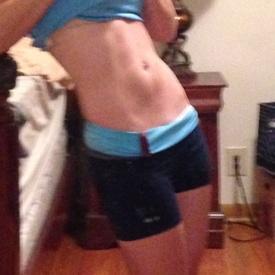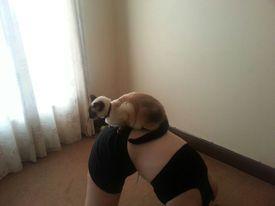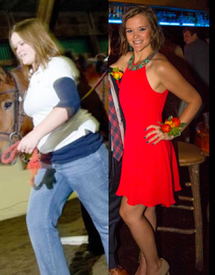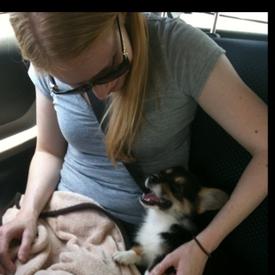What's losing weight like when you're lighter??

mizukikuro
Posts: 42 Member
I've been on my weightloss diet for about a year now and I was 18 and a half stone now down to 12 stone. I stopped working out due to moving and just maintained my weight.
I'm now back on my diet to get to my goal I set from the start which is 11 stone 6. I want to know what it's like to diet when not being overweight?
Is it slower/harder? Or just the same?
Thanks!
I'm now back on my diet to get to my goal I set from the start which is 11 stone 6. I want to know what it's like to diet when not being overweight?
Is it slower/harder? Or just the same?
Thanks!
0
Replies
-
It's the same, you just can't eat as much, you don't burn as many calories while working out either.
Just keep a small deficit and you will get there, I've found from myself and a lot of people on this site, large deficits when you are "normal" weight cause many other issues.0 -
Some people find it harder. This is a really good resource:
http://community.myfitnesspal.com/en/discussion/113609/relatively-light-people-trying-to-get-leaner/p10 -
There's less calories to work with and less room for error, so yes, it slows. But, it's still doable.0
-
I've never been overweight and never had an issue with dropping a couple pounds when I wanted to. Eat at a deficit and it'll come off same as for anyone.0
-
Way slower! It took me 6 months to lose 10 pounds once I went down to a normal BMI. I'm hungrier so I can't afford the big deficit I had before. I'm more active though, so it helps.0
-
I found it slower at first. What really helped me the most was trying to be more accurate with my intake, so I started using a food scale. The thread that @auddii posted helped me a lot. I realized that the key is being consistent, patient, as accurate as you can be really works.0
-
It's hard. When you're smaller, you burn less calories, so you have less to work with. Your deficit is usually smaller, so one night of overindulging can set you back. When I'm inactive, I only burn around 1650 calories per day. It's pretty hard to cut from so little.0
-
I can't really compare, but it is hard. I see some much heavier people posting a loss of a couple pounds a week, and I'm happy to lose 1. I also focus a lot on exercise, because 1390 calories a day is not much
 But a half hour on the elliptical watching TV at the gym gets me an extra 300 calories to eat! I also feel like you won't SEE results as fast, but again, I can't really compare. However, don't get discouraged by everyone saying it's harder! When I get disheartened I just switch to maintenance so I get more leeway in my diet but don't gain. Best of luck to you! 0
But a half hour on the elliptical watching TV at the gym gets me an extra 300 calories to eat! I also feel like you won't SEE results as fast, but again, I can't really compare. However, don't get discouraged by everyone saying it's harder! When I get disheartened I just switch to maintenance so I get more leeway in my diet but don't gain. Best of luck to you! 0 -
A lot depends on your weight history, I think, and how you think about dieting and weight maintenance.
I have a normal weight, which is around 135, solidly within a normal BMI range for me. I don't have to do anything in particular to stay at that weight. So for me, gaining (or losing) weight is a sign that I've been doing something out of the ordinary - eating too many rich foods, hitting the wine a little too often, slacking on the gym, etc. As soon as I quit doing whatever the unusual thing is and go back to the status quo, my weight finds its way back to normal.
If I want to take it off faster, I cut back my portions and add in another cardio day, but I don't always do that, which I suspect makes my weight loss much different from people who are thinking "In order to reach Weight X I must do weight-loss things Y and Z and carefully monitor the scale to see if I'm on track." For me, "quit drinking too much and eating like an idiot and get back in the gym" is sufficient unto the day.
I don't pay that much attention to how long it takes me to get back to normal and my body loses weight pretty erratically anyway. I don't feel like it takes a particularly long time, though.0 -
For me, it is painful lol. Once I got to 130 I was already decently lean with a low-ish body fat% from lifting in a deficit. I'm relatively short and lightly active, and I lift heavy dang weights. There was little room for error..and it was slow slow going. Almost to the point it wasn't working. When I look at pictures I can see I was losing but it was very hard to see progress on the scale.0
-
It's a lot slower personally. As you lose weight, your TDEE decreases (unless your activity level increases compared to when you were heavier), which decreases maximum the calorie deficit you can obtain (without netting below 1200) and decreases the margin of error between weight loss, maintenance, and weight gain.
What I've found helpful is to increase my physical activity as I lose weight as a way to eat more food (and build a little bit higher margin of error for my logging -especially whenever I eat out often and 100% can't guarantee that everything is accurate). At my highest weight, my TDEE was about 2000 (210lbs and sedentary according to IIFYM). 80 pounds lighter, I need to be lightly active for about 85 minutes (roughly 13000 steps according to my Fitbit) in order to have a 2000 calorie TDEE (if I am completely on bed rest, my TDEE would be about 1400 calories).0 -
I find it hard. I am short so really don't have very many calories to play with to create a deficit. I never go below 1200, and at that rate I am losing about 0.5lbs a week...if that. In order for me to do that I need to be really focused, disciplined and accurate with my diary selections. It is so easy to wipe out my deficit just by selecting the wrong entry for a piece of meat (for example). I find this exhausting, so I am super strict for a month, then I still track, but I am less OCD about it until I feel I am ready to be super strict again.
0 -
Hi, well done by the way, you have had a similar weight loss as me, I started out at 19 stone and am currently 12st 7lb. It's taken me about 18 months which is pretty slow going, mainly because the only exercise I have done up until now has been walking. I'm finding it a bit harder now as there are less calories to play with, slowly but surely is the way to go for me. Good luck.
0 -
For me it is much slower, but then I notice changes in the mirror and how I feel much more easily when I'm at a lower weight. Now 5 pounds seems like a huge difference, and when I was heavier 5 pounds didn't feel or look like much at all. So although it can be frustrating to see the scale moving more slowly, it is still very rewarding to see the changes more quickly.0
-
It's slower: you burn fewer calories from exercise and you can't create a huge deficit and still get all the nutrients you need. It took me about six months for ten pounds. Also, there's less room for error with a small deficit, so if you've gotten by eyeballing portion sizes, that probably won't work.
That said, the process is the same, so if you've been successful so far, you'll probably keep on being successful. Just be patient.0 -
It's tough, at least for me. If you want to improve body composition too, I think it's good to focus on other goals, like exercise-related ones or getting stronger.
You should also focus on the deficit, but IME you often take longer to see improvements, which can be discouraging if you don't have other goals.0
This discussion has been closed.
Categories
- All Categories
- 1.4M Health, Wellness and Goals
- 398.2K Introduce Yourself
- 44.7K Getting Started
- 261K Health and Weight Loss
- 176.4K Food and Nutrition
- 47.7K Recipes
- 233K Fitness and Exercise
- 463 Sleep, Mindfulness and Overall Wellness
- 6.5K Goal: Maintaining Weight
- 8.7K Goal: Gaining Weight and Body Building
- 153.5K Motivation and Support
- 8.4K Challenges
- 1.4K Debate Club
- 96.5K Chit-Chat
- 2.6K Fun and Games
- 4.8K MyFitnessPal Information
- 13 News and Announcements
- 21 MyFitnessPal Academy
- 1.6K Feature Suggestions and Ideas
- 3.2K MyFitnessPal Tech Support Questions















